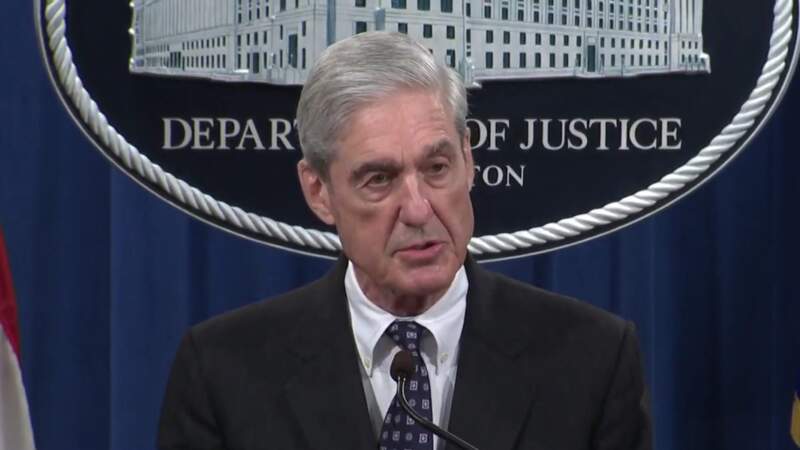Mueller Wants Congress to Do Its Job, but He Won’t Do His
Photo via YouTube screenshot Politics Features Robert Mueller
The Atlantic’s Adam Serwer had a great take in the wake of the surprise Mueller press conference disappointment: “Mueller’s statement is an indictment of a press that focused more on what people had to say about the report than what the report said, because the former was easier to cover. No one has learned anything.”
Robert Mueller called a press conference today and told us absolutely nothing new, unless you are one of the 63% of Americans who did not read any of the Mueller Report. It was easily the most succinct summary of his findings on TV news yet, and perhaps that is the main reason why he called it, as it is clear that this is a serious document that our fundamentally unserious major media cannot properly handle. But given that he ended by telling us that his 448 page report is his final word, and he is not going to testify to Congress (which is an abdication of his democratic duty) and will retreat to private life, I have a more cynical take on this whole ordeal.
There are two quotes from Robert Mueller’s press conference that explain the entire legal quandary we find ourselves in with respect to President Trump’s criminality:
“The opinion says that the Constitution requires a process other than the criminal justice system to formally accuse a sitting President of wrongdoing.”
“Charging the president with a crime was not an option we could consider.”
I wrote this countless times during the saga, but the question of whether President Trump committed crimes is not up for debate. He did. The bigger question lies in America’s supposed “genius” constitutional system that after a quarter millennium has still come to the determination that the most powerful person in the country is mostly above the law.
Granted, this isn’t entirely the constitution’s fault for giving the president immense power over the legal system—it did give us outs for a situation like President Trump—it just needs to come from a legal authority higher up on the constitutional food chain than Robert Mueller. This is why Congress has impeachment power—it’s literally a trial.
Plus, the Constitution does not explicitly say that the president is above the law. It is murky on that topic (much of this confusion comes from the fact that the president is the chief lawman’s boss). We have never had a court case seriously challenging this dynamic, and in my more hopeful times during this whole saga, I truly believed that a Supreme Court case was where this eventually had to go.
But nope, instead of using our constitutional system to its maximum utility against a criminal president, as Robert Mueller is suggesting House Democrats do, Robert Mueller is passing on the opportunity to try to establish some precedent on this topic through the judicial branch—and instead is hiding his entire rationale of not charging Trump behind just two Office of Legal Counsel memos from 1973 during the Nixon impeachment saga, and in 2000 after Clinton’s impeachment that simply said this:
The indictment or criminal prosecution of a sitting President would unconstitutionally undermine the capacity of the executive branch to perform its constitutionally assigned functions.
So there you have it, folks. After two years of intensive investigatory work on a transparently criminal president, a Republican special counsel who became a demigod on the left came to the conclusion that the Republican president was above the law before he even reached a conclusion on Trump’s criminality—all thanks to one sentence written by an office with no public democratic accountability. This memo isn’t based on any Supreme Court ruling or constitutional mandate, but a legal norm inside the Department of Justice that just kinda sorta came into being in 1973.
The constitution does not explicitly state whether or not a president can be indicted—just that Congress can charge them with crimes. The ultimate irony here is that America’s most beloved lawman is rightfully telling Democrats to use their legislative empowerment within the Constitution—all while passing on his ability to utilize the powers of the Constitution and create a fight in the courts that could finally give us some finality to this ordeal. No one should be surprised that a Bush-era Republican came to a half-assed conclusion before even investigating, and now is fleeing to “private life” without a public accounting of his work outside a 400-page report that he knows most people will not read. That’s the tl;dr of practically everyone from the Bush Era.
Ultimately, we have been told the president is above the law (except with Congress) and we can’t ask Robert Mueller any more questions. If this feels like a deeply unsatisfying ending, that’s because it is—but it’s not out of the norm. This is America. This is how power really works here. Watergate is the bug. Iran-Contra is the feature.
Jacob Weindling is a staff writer for Paste politics. Follow him on Twitter at @Jakeweindling.